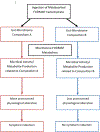The gut microbiome as a predictor of low fermentable oligosaccharides disaccharides monosaccharides and polyols diet efficacy in functional bowel disorders
- PMID: 31850930
- PMCID: PMC7425749
- DOI: 10.1097/MOG.0000000000000608
The gut microbiome as a predictor of low fermentable oligosaccharides disaccharides monosaccharides and polyols diet efficacy in functional bowel disorders
Abstract
Purpose of review: Fermentable oligosaccharides disaccharides monosaccharides and polyols (FODMAP) dietary restriction ameliorates irritable bowel syndrome (IBS) symptoms; however, not all individuals with IBS respond. Given the gut microbiome's role in carbohydrate fermentation, investigators have evaluated whether the gut microbiome may predict low FODMAP diet efficacy.
Recent findings: Gut microbiome fermentation, even to the same carbohydrate, is not uniform across all individuals with several factors (e.g. composition) playing a role. In both children and adults with IBS, studies are emerging suggesting the gut microbiome may predict low FODMAP diet efficacy. However, there is significant heterogeneity in the approaches (study population, microbiome assessment methods, statistical techniques, etc.) used amongst these studies.
Summary: The gut microbiome holds promise as a predictor of low FODMAP diet efficacy. However, further investigation using standardized approaches to evaluate the microbiome while concomitantly assessing other potential predictors are needed to more rigorously evaluate this area.
Figures

Similar articles
-
Does Fibre-fix provided to people with irritable bowel syndrome who are consuming a low FODMAP diet improve their gut health, gut microbiome, sleep and mental health? A double-blinded, randomised controlled trial.BMJ Open Gastroenterol. 2020 Aug;7(1):e000448. doi: 10.1136/bmjgast-2020-000448. BMJ Open Gastroenterol. 2020. PMID: 32816830 Free PMC article. Clinical Trial.
-
Effects of Low-FODMAPS Diet on Irritable Bowel Syndrome Symptoms and Gut Microbiome.Gastroenterol Nurs. 2019 Mar/Apr;42(2):150-158. doi: 10.1097/SGA.0000000000000428. Gastroenterol Nurs. 2019. PMID: 30946302
-
A Multicenter Randomized Controlled Trial of Microbiome-Based Artificial Intelligence-Assisted Personalized Diet vs Low-Fermentable Oligosaccharides, Disaccharides, Monosaccharides, and Polyols Diet: A Novel Approach for the Management of Irritable Bowel Syndrome.Am J Gastroenterol. 2024 Sep 1;119(9):1901-1912. doi: 10.14309/ajg.0000000000002862. Epub 2024 May 8. Am J Gastroenterol. 2024. PMID: 38717025 Free PMC article. Clinical Trial.
-
Exploring Gut Microbiota Composition as an Indicator of Clinical Response to Dietary FODMAP Restriction in Patients with Irritable Bowel Syndrome.Dig Dis Sci. 2018 Feb;63(2):429-436. doi: 10.1007/s10620-017-4893-3. Epub 2018 Jan 4. Dig Dis Sci. 2018. PMID: 29302878
-
Low-FODMAP Diet for Irritable Bowel Syndrome: What We Know and What We Have Yet to Learn.Annu Rev Med. 2020 Jan 27;71:303-314. doi: 10.1146/annurev-med-050218-013625. Annu Rev Med. 2020. PMID: 31986083 Review.
Cited by
-
Exploring the gut microbiota: lifestyle choices, disease associations, and personal genomics.Front Nutr. 2023 Oct 5;10:1225120. doi: 10.3389/fnut.2023.1225120. eCollection 2023. Front Nutr. 2023. PMID: 37867494 Free PMC article. Review.
-
The Role of Food in the Treatment of Bowel Disorders: Focus on Irritable Bowel Syndrome and Functional Constipation.Am J Gastroenterol. 2022 Jun 1;117(6):947-957. doi: 10.14309/ajg.0000000000001767. Epub 2022 Apr 8. Am J Gastroenterol. 2022. PMID: 35435179 Free PMC article.
-
Functional abdominal pain in adolescents: case-based management.Frontline Gastroenterol. 2020 Oct 19;12(7):629-635. doi: 10.1136/flgastro-2020-101572. eCollection 2021. Frontline Gastroenterol. 2020. PMID: 34917320 Free PMC article.
-
An Update on the Assessment and Management of Pediatric Abdominal Pain.Pediatric Health Med Ther. 2021 Aug 6;12:373-393. doi: 10.2147/PHMT.S287719. eCollection 2021. Pediatric Health Med Ther. 2021. PMID: 34393542 Free PMC article. Review.
-
Role of the gut microbiome in chronic diseases: a narrative review.Eur J Clin Nutr. 2022 Apr;76(4):489-501. doi: 10.1038/s41430-021-00991-6. Epub 2021 Sep 28. Eur J Clin Nutr. 2022. Retraction in: Eur J Clin Nutr. 2024 Aug;78(8):736. doi: 10.1038/s41430-024-01467-z. PMID: 34584224 Free PMC article. Retracted. Review. No abstract available.
References
-
- Hyams JS, Di Lorenzo C, Saps M, et al. Functional Disorders: Children and Adolescents. Gastroenterology. 2016;150:1456–68. - PubMed
-
- Harris LA, Umar SB, Baffy N, Heitkemper MM. Irritable Bowel Syndrome and Female Patients. Gastroenterol Clin North Am. 2016;45(2):179–204. - PubMed
-
- Reed-Knight B, Squires M, Chitkara DK, van Tilburg MA. Adolescents with irritable bowel syndrome report increased eating-associated symptoms, changes in dietary composition, and altered eating behaviors: a pilot comparison study to healthy adolescents. Neurogastroenterol Motil. 2016;28(12):1915–20. - PMC - PubMed
Publication types
MeSH terms
Substances
Grants and funding
LinkOut - more resources
Full Text Sources
Research Materials

